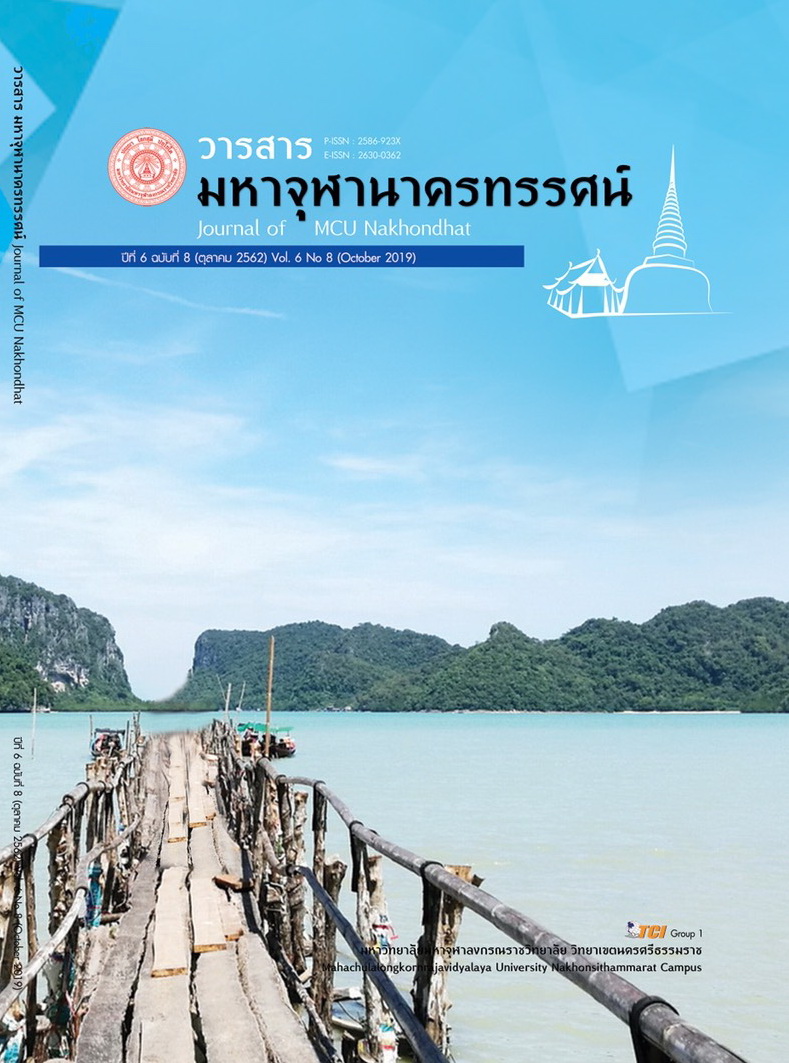A STRENGTHENING GUIDELINE OF THE BODHISATTVA ON THE ETHICAL BASE OF MAHAYANA BUDDHISM ON BUDDHIST PSYCHOLOGY
Main Article Content
Abstract
This research The objectives are 1) to study the theories, principles strengthen the Bodhisattva on the ethics of Buddhism, Mahayana Buddhist Psychology 2) to analyze and synthesize the Bodhisattva on the ethics of Buddhism, Mahayana Buddhist psychology and 3). Buddhist teaching process to move towards a Bodhisattva on the ethics of Mahayana Buddhism along output. Tim Psychology A qualitative study Data from in-depth interviews of scholars who specialize in the field of philosophy and Mahayana various grades of 13 and the Group of 13 experts to verify the integrity of the research.
The results showed that:
The Faith Acts 4 and 6 aspiration ideology into three principles that can carry humans to the Bodhisattva Way of Mahayana Buddhism is the ethical base. The Bodhisattva on the ethics of Buddhism, Mahayana Buddhist psychology. The ethics of Mahayana Buddhism is the main idea of mercy to the creatures who need to be both wise and kindly together in order to achieve the Bodhi condition. The unique characteristic of Mahayana And approaches to strengthen the Bodhisattva on the ethics of Buddhism, Mahayana Buddhist psychology strategies and teaching moral reasoning Kohlberg's developed into the teaching process: 1) assessing the moral reasoning about faith goal. the bodhisattva aspiration Acts 6, 4, 3, 2 and ideology) conducted by intrigue and tactics teaching to Buddhists. Serial to bring back the practice and 3) follow-up assessment of moral reasoning.
Article Details
References
กุมารชีวะ. (2537). สัทธรรมปุณฑริกสูตร แปลโดย ฉัตรสุมาลย์ กบิลสิงห์. กรุงเทพมหานคร: เรือนแก้ว การพิมพ์.
คณะรัฐมนตรี. (2557). คำแถลงนโยบายของคณะรัฐมนตรี พลเอกประยุทธ์ จันทร์โอชา แถลงต่อสภานิติบัญญัติแห่งชาติ วันที่ 12 กันยายน 2557 ในข้อ 10 การส่งเสริมการบริหารราชการแผ่นดินที่มีธรรมาภิบาลและการป้องกันปราบปรามการทุจรติและประพฤติมิชอบในภาครัฐ. เรียกใช้เมื่อ 20 สิงหาคม 2561 จาก https://th.wikisource.org/wiki/คำแถลงนโยบายของคณะรัฐมนตรี_วันที่_12_กันยายน_2557
พระครูปริยัติคณานุรักษ์ (พงษ์สันติ์ ศรีสมงาม). (2553). การศึกษาเปรียบเทียบบารมีในพระพุทธศาสนาเถรวาทและมหายาน. ใน วิทยานิพนธ์พุทธศาสตรมหาบัณฑิต สาขาวิชาพระพุทธศาสนา. มหาวิทยาลัยมหาจุฬาลงกรณราชวิทยาลัย.
พระธรรมปิฎก (ประยุทธ์ ปยุตฺโต). (2544). พุทธธรรม (ฉบับเดิม). (พิมพ์ครั้งที่ 11). กรุงเทพมหานคร: สำนักพิมพ์ดวงแก้ว.
พระมหาจิรศักดิ์ จิรธมฺโม (แสงเงิน). (2555). ศึกษาโพธิสัตว์ศีลในพระพุทธศาสนามหายาน. ใน สารนิพนธ์พุทธศาสตรดุษฎีบัณฑิต สาขาวิชาพระพุทธศาสนา. มหาวิทยาลัยมหาจุฬาลงกรณราชวิทยาลัย.
พระสันติ สิทธิสมบูรณ์ (ถ่ออาง). (2554). การศึกษาเปรียบเทียบการบำเพ็ญบารมีของพระโพธิสัตว์ ในคัมภีร์พระพุทธศาสนาเถรวาทกับมหายาน. ใน วิทยานิพนธ์พุทธศาสตรมหาบัณฑิต สาขาวิชาศาสนาเปรียบเทียบ. มหาวิทยาลัยมหาจุฬาลงกรณราชวิทยาลัย.
วิศิน อินทสระ. (2532). พุทธปรัชญามหายาน. กรุงเทพมหานคร: สำนักพิมพ์ มหาวิทยาลัยรามคำแหง.
สถิต วงศ์สวรรค์. (2529). จิตวิทยาสังคม. กรุงเทพมหานคร: บำรุงสาส์น.
สุมาลี มหณรงค์ชัย. (2529). มหายาน ภาษาคน-ภาษาธรรม. กรุงเทพมหานคร: สำนักพิมพ์อมรินทร์.
สุวภรณ์ แนวจำปา. (2554). ศึกษาพัฒนาการแนวคิดเรื่องอุดมคติของพระโพธิสัตว์. ใน สารนิพนธ์พุทธศาสตรดุษฎีบัณฑิต สาขาวิชาปรัชญา. มหาวิทยาลัยมหาจุฬาลงกรณราชวิทยาลัย.


